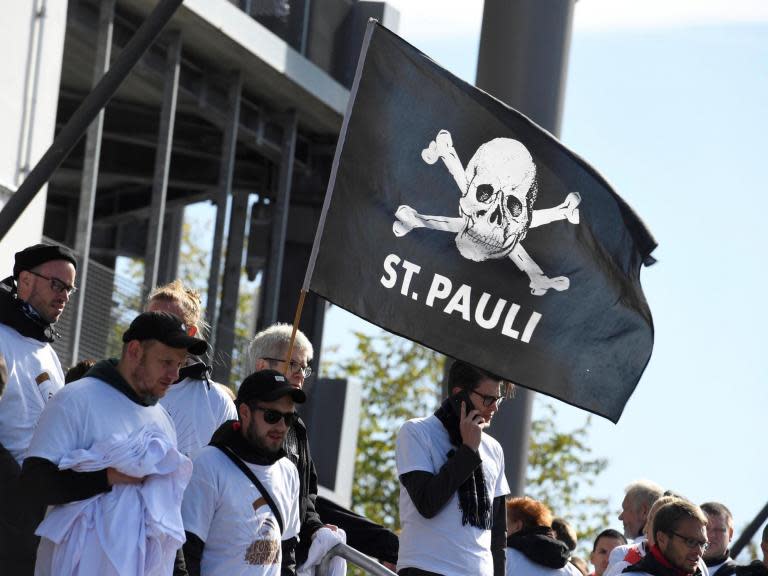How a lowly German football club is inspiring a movement that counters the ugly side of the sport
Racist organisations have long coveted the collective power of football fans. In Britain, football – The National Game – remains the most popular sport in the country. To many who follow it, such is the tribal pull of their fandom; the word “sport” doesn’t even come close to describing the importance of football in their lives.
Whether it’s the National Fronts’ presence on the crumbling terraces of the seventies or eighties, or more recently, the recruitment drives outside British stadia by the English Defence League or the Football Lads Alliance, such organizations have long known that within football, there’ll always be a gene pool of passionate men ripe to radicalise.
Football is ugliest when the society it exists in is at its worst. “We’d get off the coach at away matches and the National Front would be right there in your face,” recalls the former West Brom defender Brendon Batson of his time playing for the West Midlands club during the late seventies.
“In those days, we didn’t have security and we’d have to run the gauntlet. We’d get to the players’ entrance and there’d be spit on my jacket or Cyrille [Regis] shirt.”
Last December, video footage was aired of Manchester City and England forward Raheem Sterling being racially abused by Chelsea supporters. The same month, Arsenal forward Pierre-Emerick Aubameyang had a banana thrown at him by Tottenham fans. Such incidents speak volumes about the hate and division we’re currently seeing in politics, on social media and beyond.
And yet there is a resistance forming, predominantly within the British lower leagues, by supporters who have taken influence from openly anti-fascist German second division club St. Pauli, and appropriated their message to suit the needs of the British terrace.
A relatively apolitical club (and if truth be told, on the pitch, terrible) until the mid-1980’s, St. Pauli’s base close to the docks of Hamburg – and the nearby red-light district the Reeperbahn –lent itself to the support of squatters, activists and artists who populated the area, leading to the club adopting an alternative fan culture based around social activism and left-wing politics.
Today, the club’s iconic skull and crossbones logo, and the merch it’s printed upon, has become an international symbol of anti-fascism. Go to a punk rock concert, and you’ll see almost as many St. Pauli shirts as you will on a matchday at the Millerntor-Stadion.
St. Pauli’s influence – and that of the European “Ultra” movement – can be seen on British terraces both varied and wide.
Towards the foot of the English football pyramid, there’s Clapton Community Football Club, a breakaway club formed by the Clapton Ultras, a fan group more left-leaning than the present owners of Clapton FC were willing to accommodate. In recent years, they’ve taken the east London club’s average attendance from single digits to three figures – and done so wearing an away strip designed to honour the sacrifices of anti-fascist fighters during the Spanish Civil War.
Towards the top there’s Crystal Palace, whose Holmesdale Fanatics and their choreographed match-day routines are so beloved by every Match Of The Day producer wanting to kick-off a programme with a bang.
Elsewhere, with varying degrees of success, there’s Aston Villa’s Brigada 1874, Leicester Fosse Boys, Middlesbrough’s Red Faction and Celtic’s Green Brigade.
The word “Ultra” has a complicated history. It’s just as likely to be used to describe the right-wing Russian hooligans fighting English fans at the 2016 European Championships as it is describing the antifa fans that serve as a club like Clapton’s inspirations; in Poland, Lech Poznan and in Turkey, Besiktas.
These are supporter bases known for the colourful banners taken to games, pyro and innovative chants, but they’re also groups with genuine political power.
Çarşı, Beskitas’ most prominent fan group, proved to be a central mobilising force for protests against Turkish president Recep Tayyip Erdoğan during the Turkish protests of 2013.
Even if they’re not attempting to topple governments, Ultra groups are capable of significant achievements. Conference South side Dulwich Hamlet recently raised thousands of pounds for the Elton John Aids Foundation after a profile raising friendly against Stonewall FC, Britain’s pioneering LGBT+ club.
So far, British clubs haven’t adopted the unsavoury elements of European Ultra culture. Why would they?
British football has a past as ugly as anyone’s. What it needs is a positive influence, and right now, the antifa Ultra’s of European football are providing that, as well as restoring some grace to the crumbling façade of The Beautiful Game.

 Yahoo News
Yahoo News 

